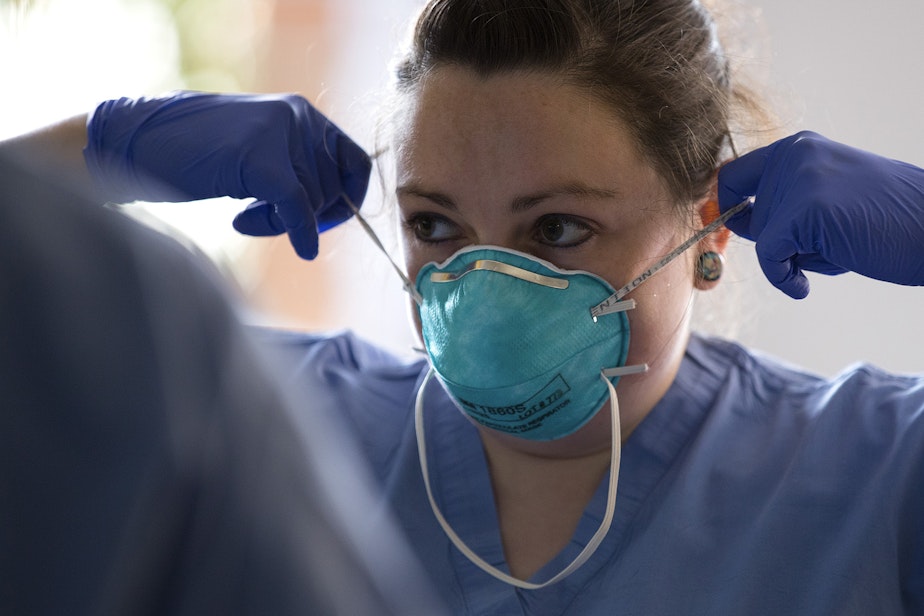'Bursting at the seams.' WA hospitals feel the pinch of long-term care shortages

It’s been an ongoing problem, amplified by the pandemic: hospitals in Washington state are overrun and overwhelmed. But right now, it’s not because of Covid patients.
“Our hospitals are bursting at the seams,” said Taya Briley, vice president and general counsel for the Washington State Hospital Association during a press conference Monday morning. “Several major hospitals and health systems are at or near 120% occupancy levels.”
The bulk of patients accounting for those hospital beds don’t actually need hospital care, Briley said. They’re long-term care patients who, under normal circumstances, would be in the care of places like skilled nursing homes or assisted living facilities. But staffing shortages in those settings, in addition to complex evaluation and placement protocols under the state’s Medicaid program, means care of those patients is being kicked to hospitals.
All the while, hospitals themselves are in the throes of a staffing crisis. Many health care professionals are leaving the field due to retirement or burnout, for instance. Moreover, there is a generation of nurses who are leaving traditional nursing jobs to work higher paying travel nurse gigs.
Briley described a dire situation for major hospitals across the state.
“Patients are receiving care in emergency department waiting rooms or in the hallways on gurneys, and waiting for days for inpatient beds to open,” Briley said.
Sponsored
The state is not currently operating within crisis care standards, under which life-saving care would be actively rationed. But Briley, along with other health care workers worry a possible surge in Covid-19 patients in the colder months would exacerbate things.
“We are concerned that a surge of hospitalizations from the omicron variant, on top of an already crowded set of hospitals, could lead to a situation where life-saving and hospital care is denied to those who need it,” Briley said.
Although early evidence suggests infection by the omicron variant could be less likely to lead to hospitalization, (this could be because the virus is moving through younger people at higher rates right now) the delta variant is still dominant in the U.S.
The overwhelming majority of people currently hospitalized with Covid in Washington are unvaccinated. Health care workers are imploring people to get vaccinated and schedule booster shots when the time comes, to keep Covid-related hospital stays at a minimum.
In addition to people with the most acute medical needs, health care workers say they worry for those who have important but non-urgent surgery needs.
“Last week alone we postponed more than 40, non-emergency but medically necessary surgical cases,” said Dr. Jay Cook, Chief Medical Officer of Providence Everett.
Sponsored
“In the meantime, patients and their families face the emotional and physical stress of having to wait for their procedure or service,” he added.
Briley said the Washington State Hospital Association is urging the state to deploy resources that could help move the long-term care placement process along faster, and is advocating for increased pay for long-term care workers. That advocacy, she said, will be seen in the upcoming legislative session this January.
Health care unions also have plans to lobby state lawmakers for solutions to staffing and capacity issues.
“We are here to issue an urgent call to the state legislature to pass common sense legislation for safe staffing standards, that enable health care workers to do their job safely and give patients the care they deserve,” said registered nurse Diane Sosne during a press conference Monday announcing a new “WA Safe + Healthy” campaign. The campaign is led by a coalition of health care workers unions.
A survey conducted by the group earlier this month found that 84% of the more than 1,100 respondents felt “very or somewhat burned out.” Nearly half of them said they were considering leaving the profession within the next few years. Among the reasons cited were, subpar pay, short-staffing, and workplace safety concerns.
Sponsored
Sosne said the group hopes to see these issues addressed through legislation. She said the campaign is prepared to work with the Washington State Hospital Association, along with hospitals themselves to achieve those legislative goals.




